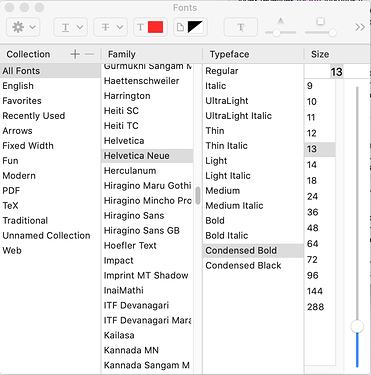Hi rms,
To begin, my understanding of the nomenclature: T1/phv/sb/n is that it stands for:
T1 - TEX extended text (See https://ctan.math.utah.edu/ctan/tex-archive/macros/latex/base/fntguide.pdf)
phv - Adobe Helvetica (See https://ctan.math.utah.edu/ctan/tex-archive/macros/latex/base/fntguide.pdf)
sb - Semi Bold (See fonts - Possible values for \fontseries and \fontshape - TeX - LaTeX Stack Exchange)
n - upright (normal) (See fonts - Possible values for \fontseries and \fontshape - TeX - LaTeX Stack Exchange)
Thanks for your response. Let me take your questions/comments one-by-one.
- are you using the Scrivener Template for LaTeX? I use it with the their default Memoir class
Yes, almost four years ago, I started with the General Non-fiction (LaTeX) Scrivener Template for LaTeX, and continue to use the LaTeX (Memoir Book) class with what is now the 28.Xth descendant therefrom.
- If so have you changed anything? I’ve tweaked mine, but never saw this error
Like most authors, the original version of my LaTeX code has undergone a few revisions, so Yes, I have changed quite a bit. That said, without the original General Non-fiction (LaTeX) Scrivener Template, I think it is fair to say I would not have had any idea how to get started using LaTeX with Scrivener.
That said, the fact that you 'never saw this error' (actually a Warning) tells me that it’s not something that is endemic with the Scrivener template.
- which Latex compiler you using? I use Texmaker
I use TeXShop, a LaTeX and TeX editor, and previewer, for macOS, by Richard Koch at the University of Oregon.
I’d be surprised if the Warning I posted about has anything to do with the compiler I am using. What little I have been able to assess is that the Warning has to do with the particular Font shape (sb - semi-bold) not being available at the time of compilation, not the type of compiler being used. But hey, each day I’m learning more and more about just how little I know and understand about the wonderful world of LaTeX.
Re:
When I mentioned that I had:
I implied having done an extensive internet search, and the reference you posted was the first one from SE (See “Font shape undefined” with LaTeX and isodoc) that I looked at.
However, in the top answer in the SE post, the only fix that was offered was:
...not writing '\bfseries\scshape' in the first place will resolve the warning :)
I would love to not use the Adobe-Helvetica Semi Bold font to stop the Warning I mentioned above. As the Warning appears everywhere in the .log file for my Scrivener-LaTeX project, it profoundly distracts any effort to debug the code.
Unfortunately, I have NO clue how or where I may have used the Adobe-Helvetica Semi Bold font, as opposed to simply the Adobe-Helvetica Bold font.
I’m not even aware of how one would go about searching a Scrivener project file for the presence of a particular font, in this case the Adobe-Helvetica Semi Bold font … Any clues to that end would be greatly appreciated!!
(If you sense a bit of frustration in the tone of my response above, my apologies, as I am faced with the limitations of my own understanding of the entire world of font issues related with LaTeX.)
Thank you again for your response,
scrive

Update: I checked with the Scrivener font palette (P. 410 of the manual) and there is NO (Adobe)Helvetica Semi Bold font that I could see. I only found a ‘Condensed Bold’ in the Helvetica Neue font family that may be what is being interpreted as Adobe Helvetica Semi Bold font on the LaTeX side.
But I also did not see any reference in the Scrivener manual to a utility to search for a particular font within a Scrivener project. If anyone can correct me, I’d be immensely grateful! - scrive
![]()
